Greek Playing Cards
Greek Playing Cards.

Ancient Greece was the birthplace and cradle of European civilisation.
Greek mythology has, of course, featured in the design of playing cards and "Ancient Civilisation" games in many parts of the world since at least the seventeenth century. Card playing is not as popular in Greece as it is elsewhere and the uptake has been slower than in other parts of Europe. Greek card players today use either the Anglo-American or French National pattern, but a number of tourist souvenir packs are produced featuring Greek Mythology, Ancient Lovers or photographs of Greece. Belgian or Genoese style cards have also been used. In the 1920s the manufacturers Paignioxartopoeion e Elpis of Corfu made a pack with Venetian format and Greek mythological figures on the court cards. This pack disappeared after the Italian invasion in 1939. Grafika Teknai Aspioti-Elka of Athens introduced a national French-suited pattern, also with classical figures on the court cards, which remained in production for many decades.
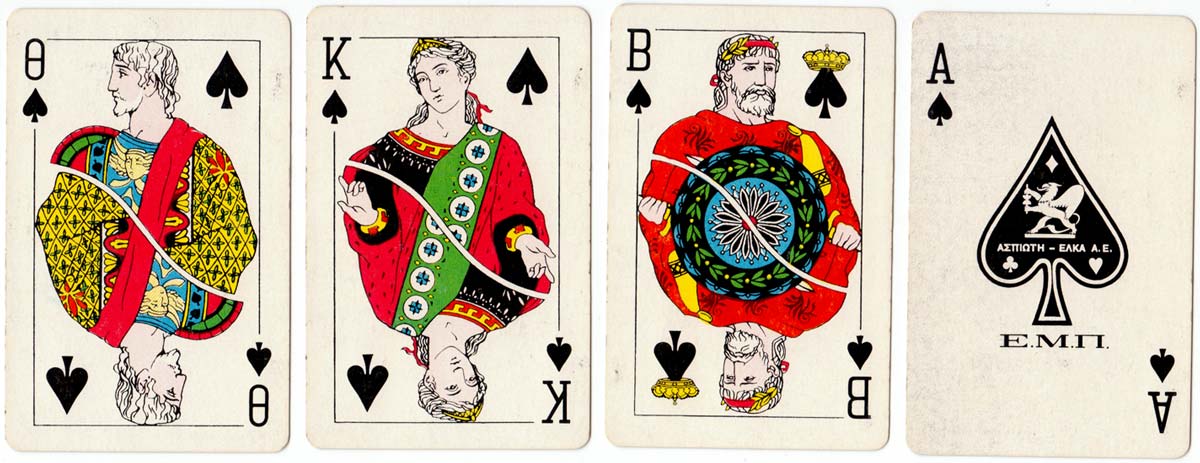
Above: deck manufactured by Aspioti Elka A.E. "Elleinikon Monopolion Paienioxarton. Klasis A Koina", 52 cards + 2 Jokers, 1960. The court cards portray ancient heroes of Greece see more►
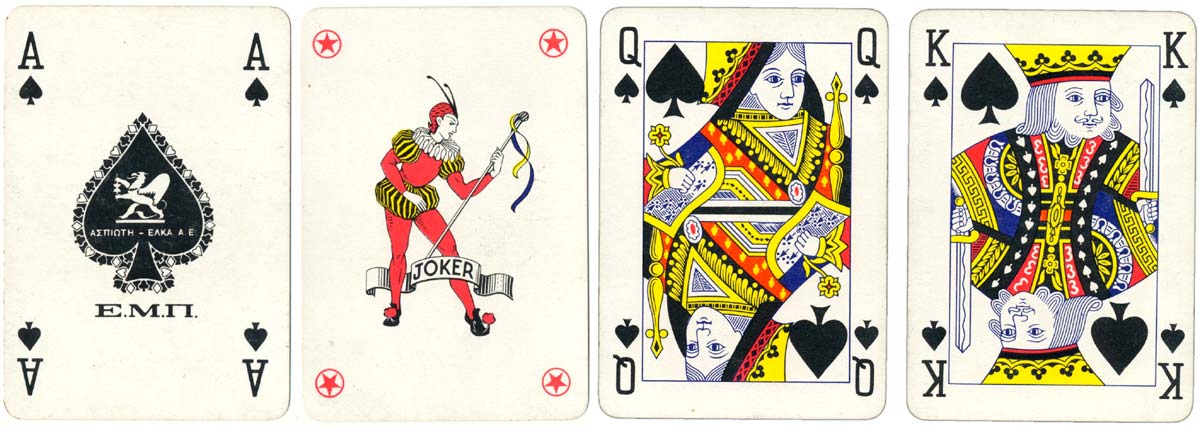
Above: standard Anglo-American playing cards manufactured by Aspioti-Elka of Athens see more►
Greece had a monopoly on the manufacture and sale of playing cards since 1884. Joining the European Community on January 1, 1981, led to the abolition of the playing card monopoly in 1986. Malikouti and Aspioti-Elka finally ceased their activities. Cards were produced by other local manufacturers or imported from elsewhere.
Greek Mythology
The myths of the early Greeks have given world literature some of its greatest inspiration, while the dramatists set the pattern on which drama has developed ever since.
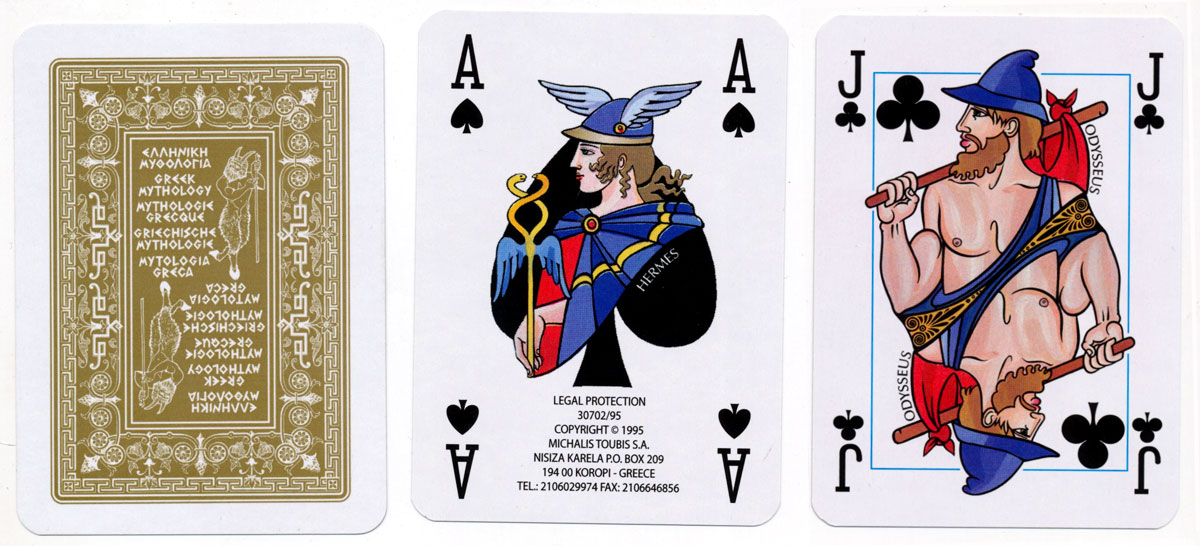
Above: Greek Mythology playing cards published by Michalis Toubis S.A., 1995. The courts show double-ended images of Greek Gods, with Anglo-American indices, 52 cards + 3 Jokers in Box. See also Cyprus Souvenir published by Michalis Toubis S.A.►
Above: Greek Mythology playing cards published by Panco-Carta Editions, 2011. Cards courtesy Sean Parry.
More Greek Mythology playing cards
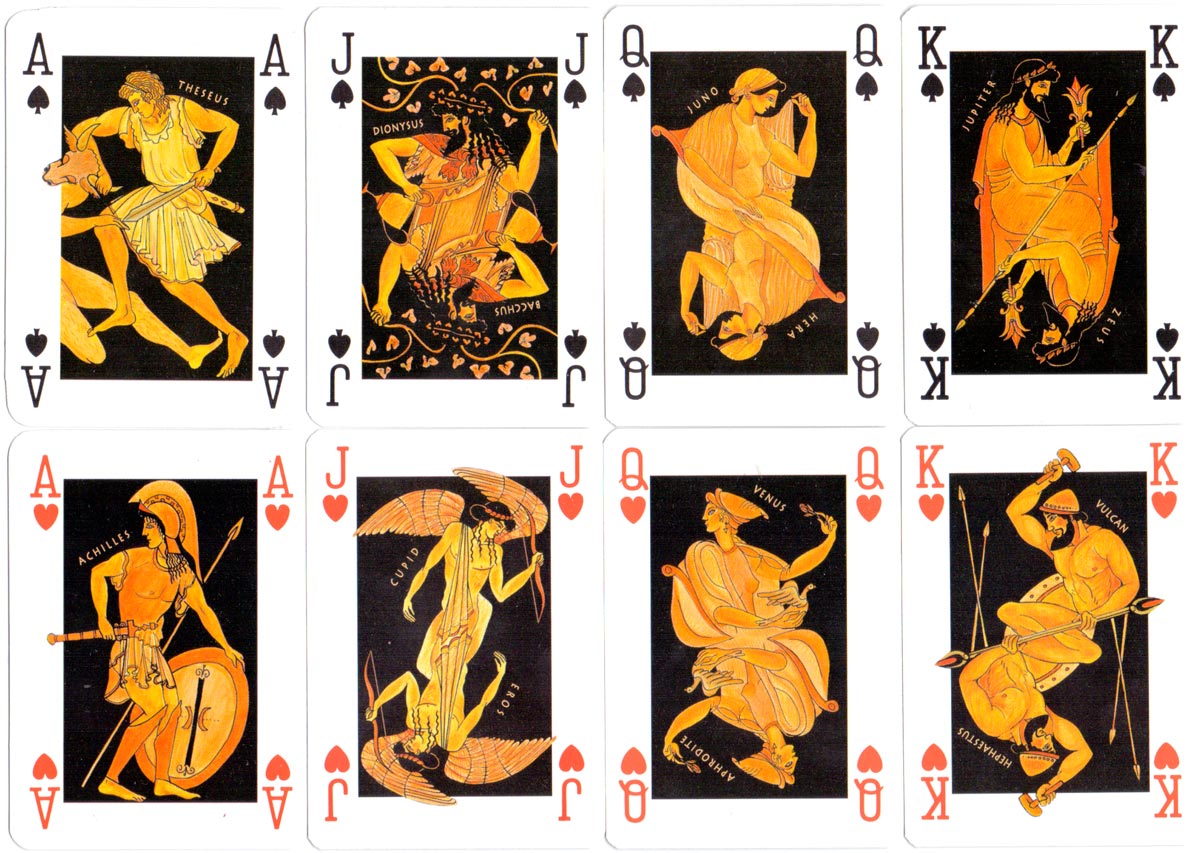
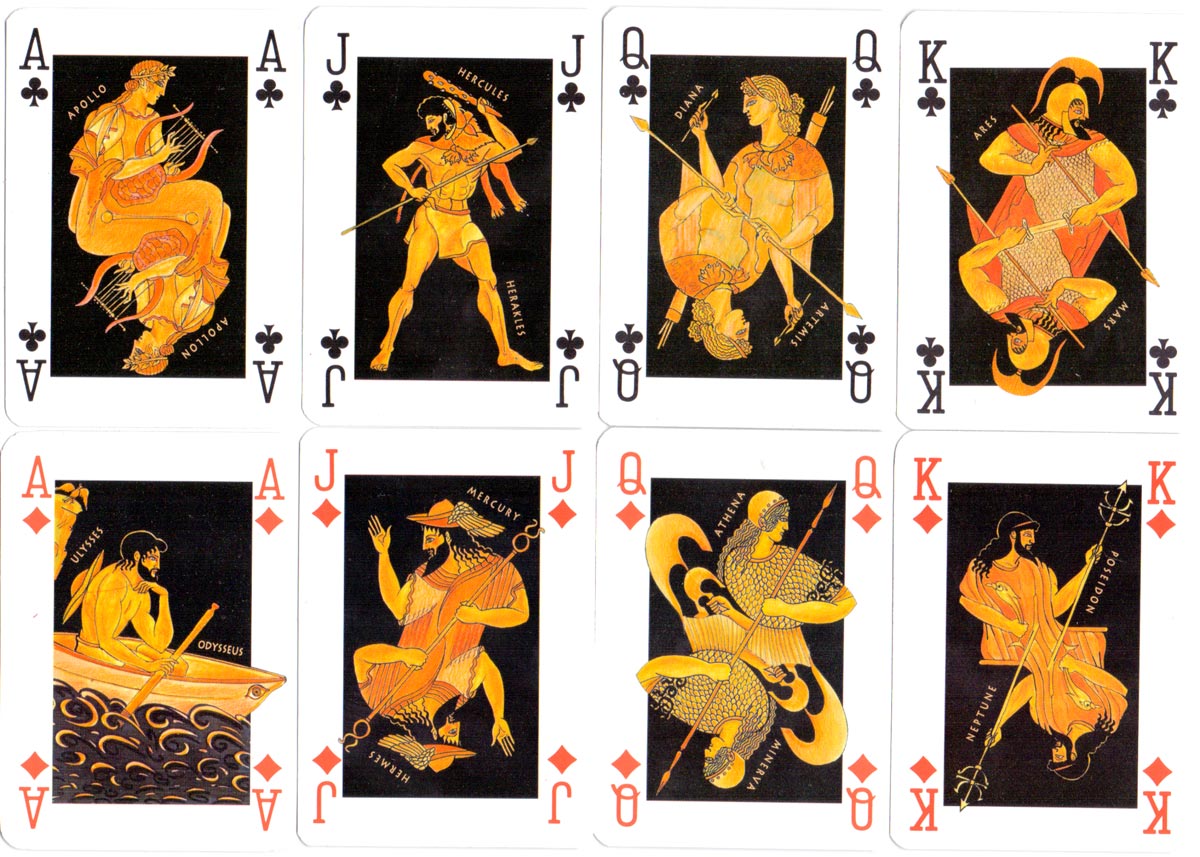
Above: Greek Mythology playing cards published by Greko Editions, Athens, c.1990. 52 cards + 3 jokers in box. The court cards show double-ended drawings of Greek gods with a Greek warrior on the reverse.
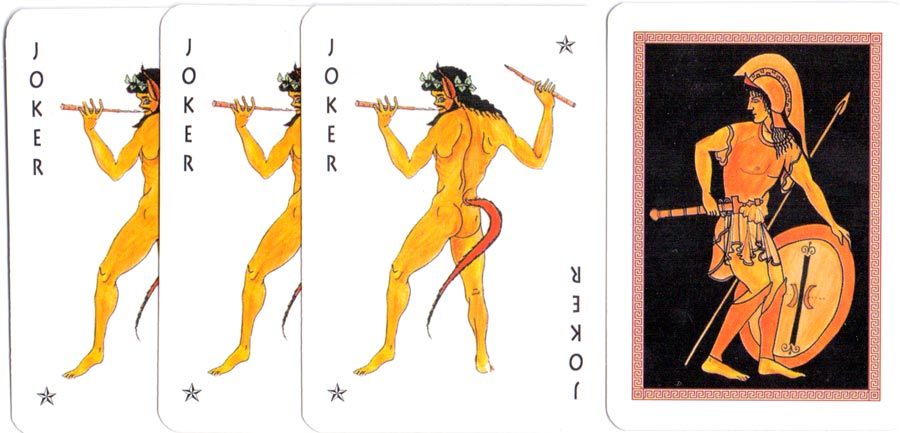
Souvenir of Greece
Greek Souvenir playing cards are produced in various styles, ranging from colour photos of Greek scenery to photos of artefacts in museums celebrating ancient Greek civilisation. Some editions of "Greek Playing Cards" are a standard English pattern with a cheerful colour photo of a Greek Island on the reverse, made by a local manufacturer such as Dama Pica Ltd. see example here►. Advertising decks for Greek shipping lines or other businesses are often produced by foreign manufacturers rather than national ones.
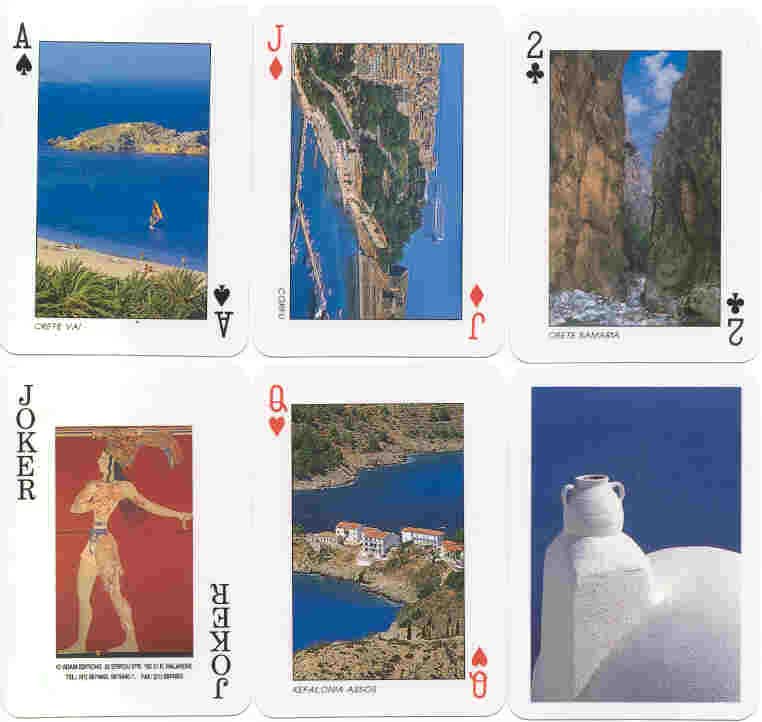
Above: Greek Souvenir playing cards with a colour photo on each card, published by Adam Editions, 1998. The reverse shows a white rooftop, chimney and blue sky. 52 cards + 2 Jokers.
Eurocard, c.1980
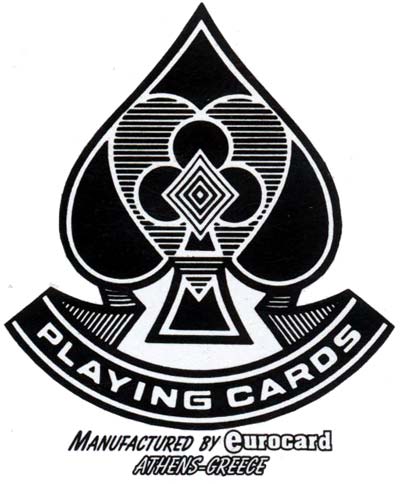
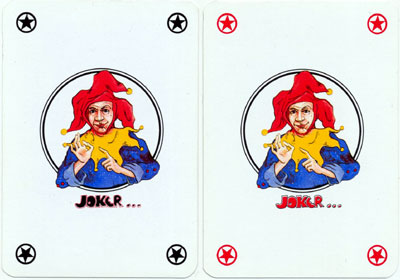
Above: Eurocard playing cards No.207, c.1980 • Souvenir of Crete • Souvenir of Kos • Souvenir from Zakynthos
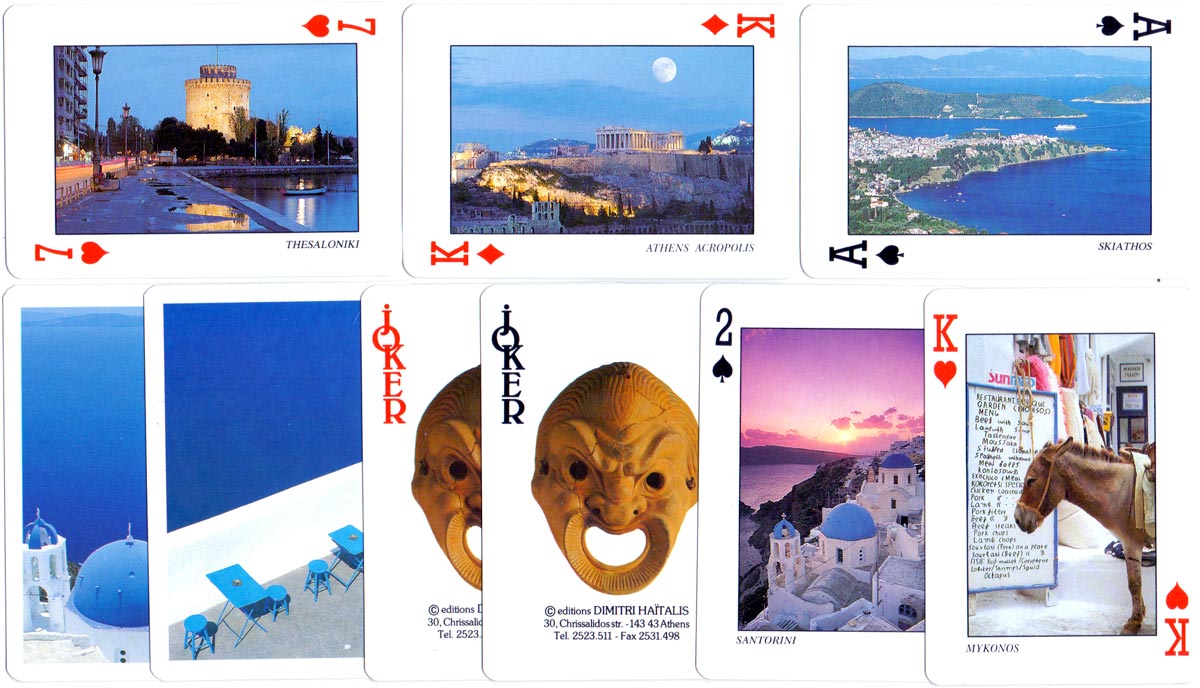
Above: cards from a double boxed set of “Greek Playing Cards with photos of the most beautiful Greek places” published by Dimitri Haïtalis, Athens, c.1980.
Eros
The ancient Greek works of art were closely related to the practical or religious purpose for which they were primarily designed. Classical Greek art is an art charged with meaning that appeals as much to the intelligence as to the sensibility. A large number of Greek painted vases have survived, and these often used the human figure as part of their ornamentation. The images are often striking in their accurate and vivid observation, taken from life. The human body was drawn at the peak of its youth and strength with explicit anatomical detail. Aphrodite was often venerated in vase painting, surrounded by Loves and Graces, beautiful nude young women and finely shaped youths.
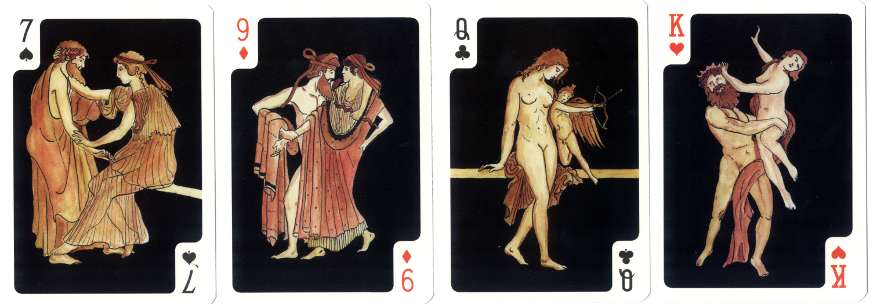
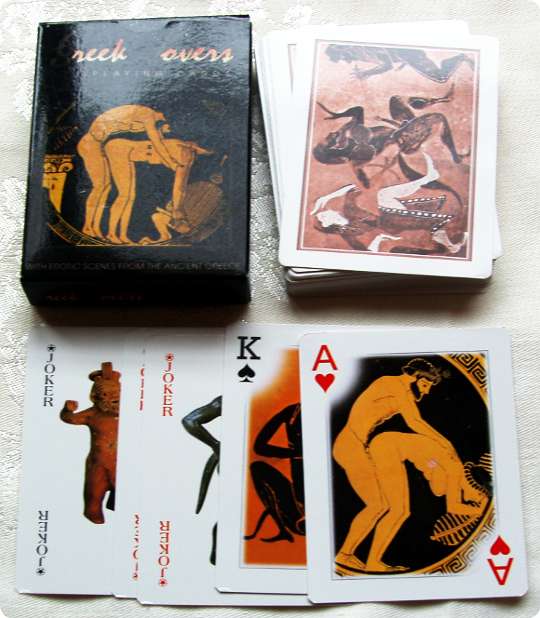
Above: four cards from "Antique Lovers" playing cards published by Editions Panco-Carta, 54 cards with images of Greek Ancient Lovers. Cards courtesy Sean Parry.
Left: Many works of art which decorated Greek pottery contained allusions to everyday life with all its delight in athletic sports and its passionate love of youth and beauty. The "Greek Lovers" playing cards shown here feature erotic scenes from Ancient Greek art on every card, published by Michalis Toubis S.A., 1995, 52+3j in Box.
Some Greek artists loved youthful bodies in slightly languid poses, often depicting the softness of flesh, engaged in carefree leisure. Other artists strove to depict idealised beauty as promoted in Platonic teachings. The many facets and phases of Greek art provide a rich source of imagery for Greek tourist souvenir playing cards.

By Simon Wintle
Member since February 01, 1996
I am the founder of The World of Playing Cards (est. 1996), a website dedicated to the history, artistry and cultural significance of playing cards and tarot. Over the years I have researched various areas of the subject, acquired and traded collections and contributed as a committee member of the IPCS and graphics editor of The Playing-Card journal. Having lived in Chile, England, Wales, and now Spain, these experiences have shaped my work and passion for playing cards. Amongst my achievements is producing a limited-edition replica of a 17th-century English pack using woodblocks and stencils—a labour of love. Today, the World of Playing Cards is a global collaborative project, with my son Adam serving as the technical driving force behind its development. His innovative efforts have helped shape the site into the thriving hub it is today. You are warmly invited to become a contributor and share your enthusiasm.
Related Articles

Sannois dans les étoiles
Celebrities and buildings associated with Sannois, a commune in the suburbs of Paris.

Visite Mexico
Promoting Mexican tourism with 54 different photographs in full colour.

Baraja de Juan Martín Zamorano
Deck inspired by El Pendón de los Zamorano, a military pennant dating from 1501, published by Priego...

The Glasgow Pack
Issued to celebrate Glasgow’s reign as European City of Culture in 1990, with city views and works o...

Baraja Turística del País Vasco
Basque poker deck of 55 cards published by Fournier with scenic views of the Basque Country.

English Heritage
52 different colour photos of historic sites managed by English Heritage.

Covered bridges playing cards
Historical covered bridges with photography by Bill Miller, 2006.

Hispania Romana
Educational card game depicting the Roman period in Spanish history.

Go Go Gorillas!
Go Go Gorillas! charity playing cards sponsored by the Eastern Daily Press and the Norwich Evening N...

Piatnik’s 200th Anniversary
A special philatelic souvenir for Piatnik’s 200th anniversary, combining playing cards an...

Sissi playing cards
produced for the Austrian tourist market.

Seashells playing cards
Each card shows colour photo of a different seashell for easy identification.

Introduction to Collecting Themes
Playing cards can be broadly categorised into standard and non-standard designs, with collectors app...

Scenic Views of Australia
54 different scenic views of Australia in full colour.

Monuments de Paris
‘Monuments de Paris’ souvenir playing cards produced by Heraclio Fournier, c.1964.

Borna Skat
Publicity pack for the Saxon town of Borna, with designs by Andreas Wachter.
Most Popular
Our top articles from the past 28 days



